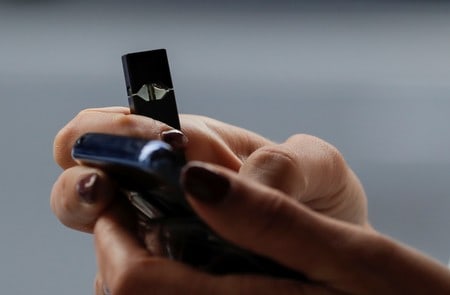By Linda Carroll
(Reuters Health) – The popular e-cigarette brand JUUL is attracting an alarming number of teens online, researchers say. At least a quarter of JUUL’s twitter followers may be under 18, they write in the Journal of Adolescent Health.
And many of these minors – to whom it is illegal to sell nicotine delivery products – are retweeting JUUL’s Twitter messages, amplifying the company’s reach to a teen audience, researchers reported.
“JUUL says it’s not trying to target adolescents, but you can see that a good proportion of the company’s Twitter audience are under 18,” said Dr. Kar-Hai Chu, an assistant professor of medicine at the Center for Research on Media, Technology and Health at the University of Pittsburgh School of Medicine. “I think we should be very worried about this.”
The new findings bolster anecdotal evidence that JUUL has become popular among teens. “The major reason we decided to do the study is there is a lot of anecdotal evidence of kids using JUUL and getting addicted” Chu said. “We wanted to systematically look at it.”
Experts say part of JUUL’s appeal to teens may be the way the product looks and how it’s marketed. The device looks like a flash drive and it can be plugged into a computer to recharge. It is available in multiple colors and comes in an attractive package. The e-liquid comes in numerous youth-friendly flavors, such as mango and fruit medley, and is packaged in a “pod.”
To get a closer look at teen interest in the product, Chu and his colleagues pored through tweets and found 3,239 from JUUL’s official Twitter account between February 2017 and January 2018. These tweets were retweeted 1,124 times by 721 unique Twitter users. Trained human coders examined each of the user’s Twitter profiles to determine if the individual was under age 18. Their job was easy when the user specified his or her age. If not, then the coder looked for clues in the user’s tweets, such as if the user mentioned a grade level or an age-specific event in a tweet, such as, ‘I’m excited about my upcoming sweet 16.” If there was any doubt, the user was categorized as an adult.
The researchers determined that out of the 681 retweeters for whom an age could be proven or estimated, 171 were under 18, with 107 identified as “followers” of JUUL on Twitter. It’s not clear whether all these retweeters were actual users of the product, however.
“Determining that is a next step for us,” Chu said. “What they’re posting on social media doesn’t mean they’re using JUUL. We’re just looking at their exposure to the messages. We can’t say if they had an intention to buy it.”
In a statement to Reuters Health, a JUUL Labs spokesperson said the company has “taken numerous actions to prevent and combat underage use, including focusing our website and social media exclusively on the adult smoker community and removing all product-related content from our social media accounts. . . we have also aggressively worked with social media platforms to remove posts and accounts that portray our product in unauthorized and youth-oriented manners.”
Still, the new findings “are in line with what we hear anecdotally and what we observe in the world: youth are the ones being influenced,” said Dr. Michael Blaha, a researcher who specializes in the epidemiology of e-cigarette use and its potential cardiovascular toxicity and director of clinical research for the Johns Hopkins Ciccarone Center for the Prevention of Heart Disease in Baltimore, Maryland.
“The JUUL comes in a smaller size so it’s easier to conceal,” Blaha said. “It’s got a ‘cool’ factor, between the skin colors and the flavors. I’ve been told their (marketing) approach is more like the Apple approach. And somehow they’ve made that simple connection with kids.”
As a general rule, the vapors inhaled by e-cigarette users contain a higher dose of nicotine than traditional cigarettes, Blaha said. But, “I’m sure many kids don’t view this as a tobacco product,” he added. “I encounter a lot of people in my research who don’t think it’s a tobacco product. So they think smoking is bad, but vaping is different.”
The marketing strategies JUUL is using “are definitely reminiscent of the way tobacco companies used to target youth,” said Dr. Luke Benventuo, a transplant pulmonologist with the Center for Lung Disease and Transplantation at NewYork-Presbyterian/Columbia University Irving Medical Center in New York City. “I’m pretty concerned.”
“The consequences of inhaling vapor is a huge unknown,” Benventuo said.
Moreover, even if you’re not getting all the carcinogens you get with regular cigarettes, “you do get nicotine,” Benventuo said. “There are lots of studies that show nicotine is dangerous and toxic to the adolescent brain.”
SOURCE: http://bit.ly/2JaRKta Journal of Adolescent Health, online October 19, 2018.


